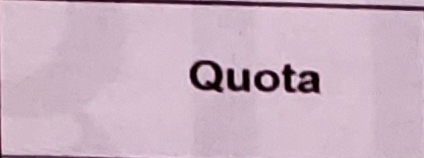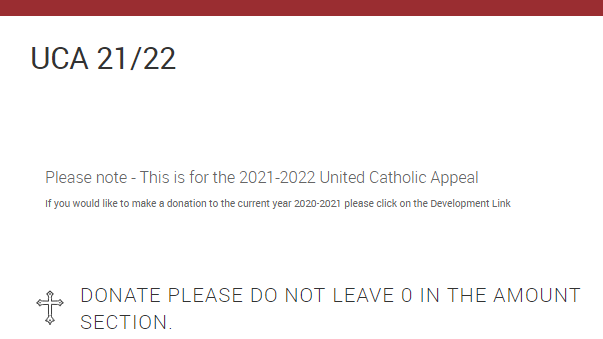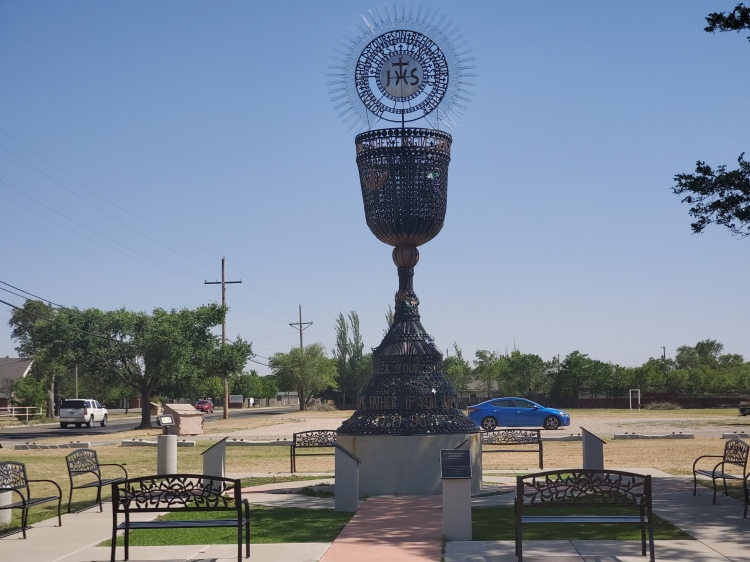Be yourself; Everyone else is already taken.
— Oscar Wilde.
This is the first post on my new blog. I’m just getting this new blog going, so stay tuned for more. Subscribe below to get notified when I post new updates.
Working Locally While Thinking Ccatholic!
Be yourself; Everyone else is already taken.
— Oscar Wilde.
This is the first post on my new blog. I’m just getting this new blog going, so stay tuned for more. Subscribe below to get notified when I post new updates.

“Does this shock you?”
Jn 6:61

In recent homilies Bishop Zurek has made it clear that the standard for love and unity in our diocese should be the encyclical of Pope Francis, Fratelli Tutti. Today, let’s reflect on paragraph #195 in that regard.
195. All this can help us realize that what is important is not constantly achieving the “Quota”, since this is not always possible.

In diocesan finances, we should remember that, “appearances notwithstanding, every person is immensely holy and deserves our love. Consequently, if I can help at least one person to have a better life, that already justifies the offering of my life. It is a wonderful thing to be God’s faithful people. We achieve fulfilment when we break down walls and our hearts are filled with faces and names!”[193]

The great goals of our budget and plans may only be achieved in part with the “Pledged Amount”. Yet beyond this, those who love, and who no longer view the United Catholic Appeal merely as a quest for power, “may be sure that none of our acts of love will be lost, nor any of our acts of sincere concern for others.

No single act of love for God will be lost, no generous effort is meaningless, no painful endurance is wasted. All of these encircle our diocese like a vital force”.[194]

It is a time to help all our brothers and sisters to blossom as children of God, we do this by serving the spiritual and material needs of each other.
Bishop Patrick J. Zurek


St. Fidelis , pray that Bishop Zurek unbounds us from the quest for the “Quota”, and allows us to “Abound in Hope”, helping all our brothers and sisters to blossom as children of God,…by serving the spiritual and material needs of each other from our “Pledged Amount”.


quarreled among themselves,
Jn 6:52

In recent homilies Bishop Zurek has made it clear that the standard for love and unity in our diocese should be the encyclical of Pope Francis, Fratelli Tutti. Today, let’s reflect on paragraph #194 in that regard.

194. The United Catholic Appeal too must make room for a tender love of others. “What is tenderness? It is love that draws near and becomes real. Being “the only ones they talk to; the only ones who say their name,”.
A movement that starts from our heart and reaches the eyes, the ears and the hands… Tenderness is the path of choice for the strongest, most courageous men and women”.[191] Amid the daily concerns of diocesan finances, “the smallest, the weakest, the poorest should touch our hearts: for them, “It seems that human lives are not that important …” indeed, they have a ‘right’ to appeal to our heart and soul.

They are our brothers and sisters, and as such we must love and care for them”.[192] We must ,“act with courage, work with justice and always tell people the truth, ”.


It is a time of Hope as dry limbs bud leaves and blossoms.
Bishop Patrick J. Zurek


St. Adalbert (Vojtěch) pray for us, that Bishop Zurek brings tenderness to the UCA by unbounding us from the quarrelsome “Quota”, and allows us to “Abound in Hope” as dry limbs bud leaves and blossoms from our “Pledged Amount”.


Jesus said to the crowds: “No one can…Everyone who…Not that anyone has…except the one“
Jn 6:44-46

In recent homilies Bishop Zurek has made it clear that the standard for love and unity in our diocese should be the encyclical of Pope Francis, Fratelli Tutti. Today, let’s reflect on paragraph #193 in that regard.
193. Apart from their tireless activity, bishops are also men. They are called to practice love in their daily interpersonal relationships. As persons, they need to consider that “the modern world, with its technical advances, tends increasingly to functionalize the satisfaction of human desires, now classified and subdivided among different services. Less and less will people be called by name, less and less will this unique being be treated as a person with his or her own feelings, sufferings, problems, joys and family. Their illnesses will be known only in order to establish a quota., their financial needs only to establish a quota, their lack of a home only to establish a quota, their desires for recreation and entertainment only to establish a quota”. Yet it must never be forgotten that basing the diocesan budget on one’s pledge rather than a parish quota is “loving the most insignificant of human beings as a brother, as if there were no one else in the world but him, cannot be considered a waste of time”.[190]

Easter is the time of Resurrection and the promise of New Life.
Bishop Patrick J. Zurek


My prayer for today, is that Bishop Zurek unbounds us from the “Quota”, which seeks results from “the crowd”, and instead allows us to “Abound in Hope” in the fruitfulness of each one‘s pledge.


“Everything that the Father gives me will come to me,”
Jn 6:37

In recent homilies Bishop Zurek has made it clear that the standard for love and unity in our diocese should be the encyclical of Pope Francis, Fratelli Tutti. Today, let’s reflect on paragraph #192 in that regard.
192. In this regard, Grand Imam Ahmad Al-Tayyeb and I have called upon “the architects of international policy and world economy to work strenuously to spread the culture of tolerance and of living together in peace; to intervene at the earliest opportunity to stop the shedding of innocent blood”.[189] When a specific policy sows hatred and fear towards other nations in the name of its own country’s welfare, there is need to be concerned, to react in time and immediately to correct the course.

It is a time of change and conversion of mind and heart.
Bishop Patrick J. Zurek

“Abound in Hope”, Bishop Zurek looks forward… because he is afraid to look back.
Paraphrasing G.K. Chesterton

Bishop Zurek was not the one who bound us to the “Quota”. The United Catholic Appeal was established in 1981 to replace an antiquated system of assessing so much money per person (Quota). That structure traditionally provided diocesan financial resources, but with the two splitting of the diocese, the Chancery was having to operate with a third of the population. Instead of downsizing the Chancery to fit the new reality, a new system was developed that could supplement the Cathedraticum tax in, “Getting more from Peter (parishes) to pay Paul (Chancery).”
Over the years Paul grew larger despite Peter getting smaller, but there was no course correction. Insurance payments and the privatization (the transfer of a ministry from diocesan to private funding through the use of tuition and/or fees) of the schools and Retreat Center clothed the ever-growing Paul.
To continue this course, Bishop Zurek paid consultants for, Preparing the Way ,for more room for Paul. After construction of the new Chancery was completed, bringing on higher insurance payments for Peter, this glorified Ponzi scheme eventually bottomed out when the flood of pledges dried up and there wasn’t enough money to go around. At that point, The IGiveCatholic Campaign was established to continue the course of an antiquated system of assessing so much money per person (Quota). This structure traditionally has never been able to provide diocesan financial resources.

My prayer for today is that Bishop Zurek realizes it is past, “a time of change and conversion of mind and heart“, and unbounds us from the “Quota”, so we can “Abound in Hope” knowing that everything that the Father gives will go to Jesus, not the Chancery!


What can you do?
Jn 6:27

In recent homilies Bishop Zurek has made it clear that the standard for love and unity in our diocese should be the encyclical of Pope Francis, Fratelli Tutti. Today, let’s reflect on paragraph #191 in that regard.
191. At a time when various forms of fundamentalist intolerance are damaging relationships between individuals, groups and peoples, let us be committed to living and teaching the value of respect for others, a love capable of welcoming differences, and the priority of the dignity of every human being over his or her ideas, opinions, practices and even sins. Even as forms of fanaticism, closedmindedness and social and cultural fragmentation proliferate in present-day society, a good politician will take the first step and insist that different voices be heard. Disagreements may well give rise to conflicts, but uniformity proves stifling and leads to cultural decay. May we not be content with being enclosed in one fragment of reality.

In Lent we examine ourselves in regard to our relationship with each other as reflecting our relationship with Christ.
Bishop Patrick J. Zurek

How is the United Catholic Appeal the same as fanaticism?
They are both overcompensation for doubt!
Paraphrasing Robertson Davies

The crowd expressed their doubt in Jesus by asking, “What can you do?” This led to disagreement and gave rise to conflicts. To avoid this, Bishop Zurek expresses his doubts in us by demanding, This is what you will do!
Instead of making an, “Appeal” and allowing us to “Abound in Hope“, by showing him what we can do in the way of pledges; he will only, “be content with being enclosed in one fragment of reality”, and bounds us to a “Quota”. He is not open to, examining himself in regard to our relationship with each other as reflecting our relationship with Christ with all of its disagreements that may well give rise to conflicts.

My prayer for today is that Bishop Zurek “Abounds in Hope”, by holding us accountable for our pledges; thus making the “U” in UCA stand for “United” rather than “Uniformity”; which bounds us to a “Quota”, which proves stifling and leads to cultural decay.


Do not work for food that perishes…
Jn 6:27

190. Political charity is also expressed in a spirit of openness to everyone. Government leaders should be the first to make the sacrifices that foster encounter and to seek convergence on at least some issues. They should be ready to listen to other points of view and to make room for everyone. Through sacrifice and patience, they can help to create a beautiful polyhedral reality in which everyone has a place. Here, economic negotiations do not work. Something else is required: an exchange of gifts for the common good. It may seem naïve and utopian, yet we cannot renounce this lofty aim.

It is so appropriate that the theme of our United Catholic Appeal this year is “Abound in Hope.” For the work of the Diocese of Amarillo in the coming months will indeed be to reawaken and strengthen hope as we move out of pandemic and into a genuine renewal of the life of the Church in Amarillo and the Texas Panhandle.
Bishop Patrick J. Zurek

How do you eat an elephant?…There is an elephant sitting in our midst…Every time that we acknowledge a hurt, or disappointment, or an anger, we take a bite of that elephant and it gets a little bit smaller…I am humbly begging you to join me in sharing in the cost of ministry of our other parishes in our diocese who also have elephants sitting in their midst…
Father Tony’s UCA Appeal
In recent homilies Bishop Zurek has made it clear that the standard for love and unity in our diocese should be the encyclical of Pope Francis, Fratelli Tutti. Paragraph #190 tells us that,
leaders should be the first to make the sacrifices that foster encounter and to seek convergence on at least some issues. They should be ready to listen to other points of view and to make room for everyone. Through sacrifice and patience, they can help to create a beautiful polyhedral reality in which everyone has a place.
Bishop Zurek, who is shepherding the “elephant in the room”, should reflect on this and join our Rector as he attempts to move us, “out of pandemic and into a genuine renewal of the life of the Church in Amarillo“.

My prayer for today is that Bishop Zurek stops dishing out the mandatory, “food that perishes”, in the form of the “Quota”, and makes it possible for us to join Father Tony in working for, “food that endures for eternal life”, by allowing us to freely pledge to the United Catholic Appeal.


“Have you anything here to eat?”
Lk 24:41

189. We are still far from a globalization of the most basic of human rights. That is why world politics needs to make the effective elimination of hunger one of its foremost and imperative goals. Indeed, “when financial speculation manipulates the price of food, treating it as just another commodity, millions of people suffer and die from hunger. At the same time, tons of food are thrown away. This constitutes a genuine scandal. Hunger is criminal; food is an inalienable right”.[188] Often, as we carry on our semantic or ideological disputes, we allow our brothers and sisters to die of hunger and thirst, without shelter or access to health care. Alongside these basic needs that remain unmet, trafficking in persons represents another source of shame for humanity, one that international politics, moving beyond fine speeches and good intentions, must no longer tolerate. These things are essential; they can no longer be deferred.

As people of Faith, we know God is far greater than this enduring pandemic. He can bring nourishment, strength and growth out of whatever comes along to challenge us.
Bishop Patrick J. Zurek

The 2021-2022 United Catholic Appeal (UCA) is vague about how much it gives to “Serving the Poor”, but after reflecting on paragraph #189 of Fratelli Tutti, it can be determined that it wasn’t enough!
In recent homilies Bishop Zurek has made it clear that the standard for love and unity in our diocese should be the encyclical of Pope Francis, Fratelli Tutti. A major indication of what we value most is where our money goes. This year’s brochure features photographs of where UCA donations go, but the number one receiver of monies, the “Bishop’s Office and Chancery” and “Support Services”, is not pictured.

According to the graph on this year’s brochure nearly 40% of funds is directed to the Diocesan Pastoral Center, while less than 10% goes to “Social, Spiritual, and Pastoral Ministries”.
My prayer for today is that Bishop Zurek restores the United Catholic Appeal to bringing, “nourishment, strength and growth out of whatever comes along to challenge us.”



Dear friends in Christ,
We find ourselves living in extremely challenging times. And yet we stand today with a profound sense of hope, in the vaccines that will be capable of delivering us from the darkness of the pandemic.
Bishop Patrick J. Zurek, 2021-2022 United Catholic Appeal Brochure Letter
It seems that things are returning to “normal” in the Diocese of Amarillo. The United Catholic Appeal (UCA) brochure has been printed and published in the latest edition of The West Texas Catholic along with the status of the 2020-2021 campaign showing that parishes owe the diocese $173,501 in “Quota”; and Bishop Zurek’s “Appeal” has a new slogan, “Abound in Hope”, because our deliverer, “the vaccines” are capable of helping him meet our “Quota”.

Bishop Zurek doesn’t seem to be afraid, as the disciples are in today’s Gospel when, “they saw Jesus walking on the sea and coming near the boat, and they began to be afraid.” Perhaps he should be!
Those same disciples, as Apostles, came to believe that Jesus was the one, “To deliver them”, as demonstrated in today’s first reading, when they exclaimed, “It is not right for us to neglect the word of God to…” collect a “Quota”. Realizing this they came up with a whole new system to tend to the needs of the early Catholic Church so that they could, “devote ourselves to prayer and to the ministry of the word.”
For this 2021-2022 United Catholic Appeal I pray that Bishop Zurek, “unbounds” us from the “Quota” column, before the “Appeal” to “Abound in Hope” begins.



He is both the Bread of life and the dew of the Holy Spirit that together nourish man’s deepest hopes and desires.
Bishop Patrick J. Zurek

The Following Reflection is Based on Paragraph #188

What nourishes Bishop Zurek’s deepest hopes and desires?
Admittedly, there is a need to respect authority, but Bishop Zurek seems to have an urgent need to combat all that threatens or violates the formal, church-based, leadership or opinion of ordained clergy in matters of either the Church or broader political and sociocultural import, rather than fundamental human rights.

Bishops are called to “tend to the needs of individuals and peoples. To tend those in need takes strength and tenderness, effort and generosity in the midst of a functionalistic and privatized mindset that inexorably leads to a ‘throwaway culture’…, or in our case, the UCA. Instead of taking responsibility for the present with its situations of utter marginalization and anguish, and being capable of bestowing dignity upon it” [185] , Bishop Zurek has given into the thinking that, “Two hundred days’ wages…would not be enough
for each of them to have a little.”, and instead of developing a fundraising approach that gives us a voice in determining what is given back to God for “multiplication”, has implemented an assessment for how much we are required to “give”.

Bishops are doers, builders with ambitious goals, possessed of a broad, realistic and pragmatic gaze that looks beyond their own diocese. Their biggest concern should not be about collecting UCA assessments, but about urging the laity to find effective solutions to “the phenomenon of social and economic exclusion, with its baneful consequences: human trafficking, the marketing of human organs and tissues, the sexual exploitation of boys and girls, slave labour, including prostitution, the drug and weapons trade, terrorism and international organized crime.
Such is the magnitude of these situations, and their toll in innocent lives, that we must avoid every temptation to fall into a declarationist nominalism that would assuage our consciences into telling us that Bishop Zurek can change the reality of the UCA being an assessment simply by calling it an “Appeal”. We need to ensure that our diocese is truly effective in the struggle against all these scourges”.[187] This includes taking intelligent advantage of the immense resources offered by technological development that can allow the the bishop to adjust the Cathedraticum tax based on the current giving at his parishes to meet the diocesan budget. Furthermore, instead of holding parishes accountable for paying assessments that are based on pre-pandemic data, they would be held accountable for the actual pledges made by parishioners. Such a system would make the Diocesan Pastoral Center more aware and responsive to what is “reality” in our diocese.

For this 2021-2022 United Catholic Appeal I pray that Bishop Zurek, “unbounds” us from parish assessments, before “appealing” for us to “Abound in Hope”.


so that his works may be clearly seen as done in God.
Jn 3:21

187. This charity, which is the spiritual heart of politics, is always a preferential love shown to those in greatest need; it undergirds everything we do on their behalf.[183] Only a gaze transformed by charity can enable the dignity of others to be recognized and, as a consequence, the poor to be acknowledged and valued in their dignity, respected in their identity and culture, and thus truly integrated into society. That gaze is at the heart of the authentic spirit of politics. It sees paths open up that are different from those of a soulless pragmatism. It makes us realize that “the scandal of poverty cannot be addressed by promoting strategies of containment that only tranquilize the poor and render them tame and inoffensive. How sad it is when we find, behind allegedly altruistic works, the other being reduced to passivity”.[184] What are needed are new pathways of self-expression and participation in society. Education serves these by making it possible for each human being to shape his or her own future. Here too we see the importance of the principle of subsidiarity, which is inseparable from the principle of solidarity.

Christ is both our food and our
Bishop Patrick J. Zurek
drink.

After our priests satiate our hunger and quench our thirst with Christ, will our works be clearly seen as done in God?
The Eucharist cannot be reduced to a strategy of containment that only tranquilizes the Church and renders us tame and inoffensive. How sad it is when we find, behind allegedly altruistic works, we are simply being reduced to passivity.
For months Bishop Zurek was passive in doing anything about Monsignor Colwell’s now self-professed alcoholism, and the growing crisis it was causing at the Cathedral.
“…he, (Monsignor Colwell) is not an alcoholic. He is suffering from a very high blood pressure that is only made worse by the unnecessary stress he has endured for months.”
A Reflection on Christian Life
Our shepherd tried to reduce to passivity “a few” restless souls who saw paths open up that were different from those of a soulless pragmatism. By believing, “Prayers are important, but communities must come together to find positive solutions.”, they actively participated in shaping our future.

Monsignor Colwell followed Bishop Olmsted of Phoenix’s advice and stepped, “Into the Breach”, sought help, returned to St. Mary’s asking for forgiveness, and is now actively serving in the Diocese of Amarillo. If Bishop Zurek were to ask him, “How should one love during times of “heightened tension“?”; Monsignor’s non-passive response may very well be, “Be a man! Be an authentic Catholic man!”
